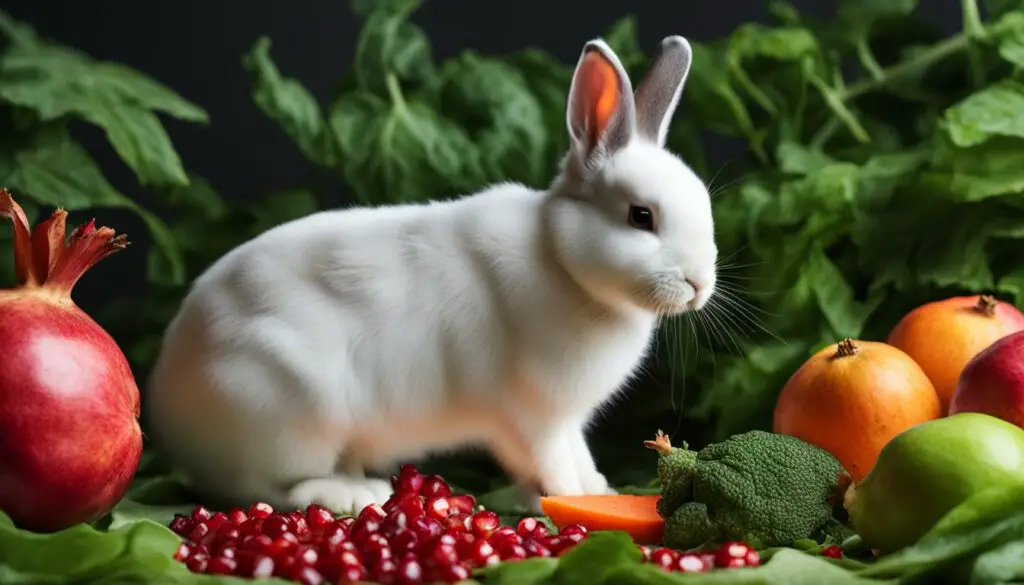In the world of rabbit nutrition, there are often debates about what is safe and healthy for our furry friends to eat. One such topic of discussion is pomegranate. Some believe that rabbits can enjoy this delicious fruit, while others have concerns about its impact on their diet. In this article, we will dive into the question: Can bunnies eat pomegranate?
Key Takeaways:
- Pomegranate can be safely incorporated into a rabbit’s diet, but in moderation.
- It is rich in vitamins C and K, fiber, and antioxidants.
- However, pomegranate should not exceed 10% of a rabbit’s diet due to its high sugar content.
- When feeding pomegranate, remove the seeds and offer small pieces as a treat.
- Observe your rabbit’s reaction and consult a veterinarian if any adverse effects occur.
Nutritional Benefits of Pomegranate for Rabbits
Pomegranate, despite being a debated topic in rabbit nutrition, can offer several nutritional benefits to our furry friends. This fruit is a good source of vitamins C and K, as well as fiber. These nutrients play a crucial role in supporting a rabbit’s immune system, promoting healthy skin and fur, aiding digestion, and providing protection against free radicals.
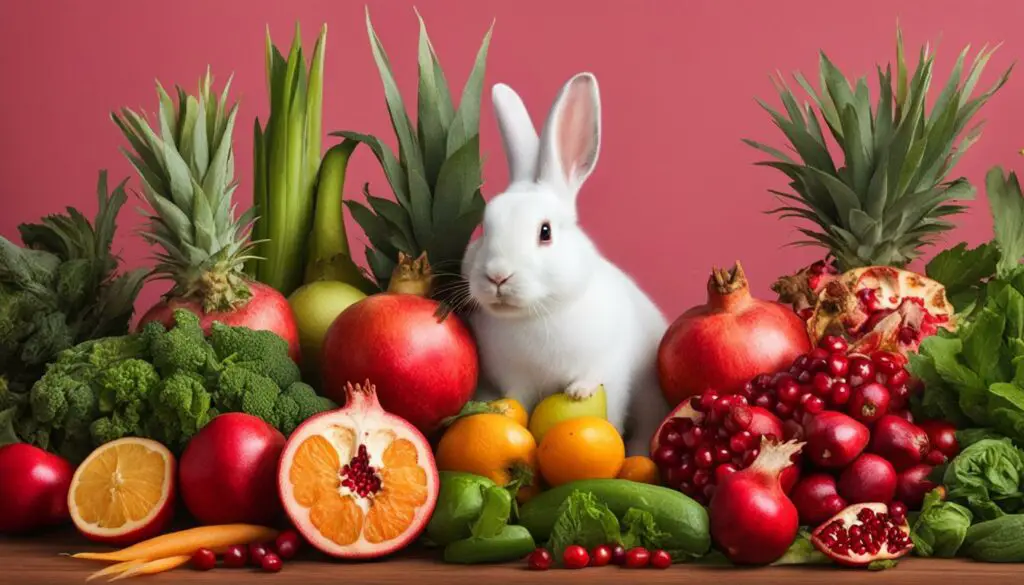
However, it is essential to provide pomegranate to rabbits in moderation. While the vitamins and fiber are beneficial, the high sugar content can lead to weight gain and other health problems if consumed excessively. Therefore, a well-balanced and varied diet is necessary to maintain the overall health and well-being of our bunnies.
Nutritional Benefits of Pomegranate for Rabbits:
- Vitamin C: Supports the immune system and promotes overall health.
- Vitamin K: Helps with blood clotting and bone health.
- Fiber: Aids in digestion and prevents gastrointestinal issues.
Feeding pomegranate to rabbits can be a delightful treat, but it should never exceed 10% of their diet. To ensure safe consumption, remove the seeds as they can be a choking hazard. Cut the fruit into small pieces and offer it as an occasional treat. Always provide fresh water to keep your rabbit hydrated.
Remember, moderation is key when it comes to feeding pomegranate to rabbits. It’s important to prioritize their health and monitor their reactions. If any adverse effects occur, consult with a veterinarian for guidance.
| Pomegranate Nutritional Information per 100g: | Amount |
|---|---|
| Calories | 83 |
| Carbohydrates | 19g |
| Sugars | 14g |
| Fiber | 4g |
| Vitamin C | 10.2mg |
| Vitamin K | 16.4mcg |
How to Safely Feed Pomegranate to Rabbits
Feeding pomegranate to rabbits can be a safe and enjoyable experience if done correctly. Here are some guidelines to ensure the safety and well-being of your furry friend:
1. Prepare the pomegranate
Start by cutting the pomegranate into small pieces and removing the seeds, as they can be a choking hazard for rabbits. Offer only the fleshy part of the fruit to your bunny. You can also mash or puree the seeds to make it easier for your rabbit to consume. Remember to remove the peel before serving the pomegranate to your rabbit.
2. Feed in moderation
Pomegranate should be given to rabbits as a treat in moderation. Offer small amounts of pomegranate to your rabbit and observe their reaction. If your rabbit enjoys it and tolerates it well, you can gradually increase the serving size. However, it is important to avoid overfeeding as the high sugar content in pomegranate can lead to weight gain and other health issues.
3. Provide clean water
Always ensure that your rabbit has access to plenty of clean water. The water will help keep your rabbit hydrated and aid in digestion.
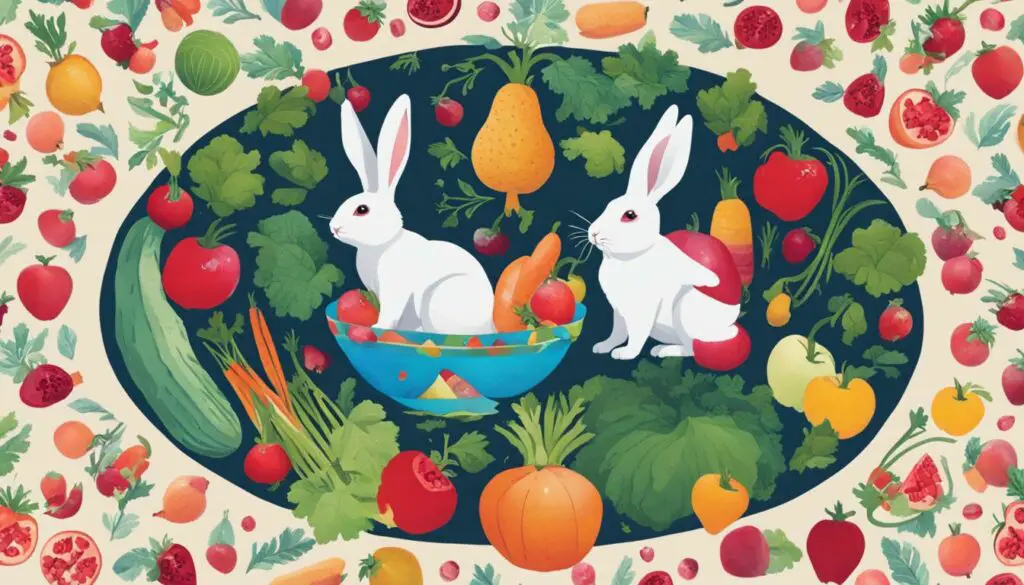
By following these guidelines, you can safely introduce pomegranate into your rabbit’s diet. Remember to monitor your rabbit’s health and digestion, and consult with a veterinarian if you have any concerns.
Recommended Amount of Pomegranate for Rabbits
When it comes to feeding pomegranate to rabbits, it’s important to do so in moderation. While pomegranate can provide nutritional benefits, it should not make up a large portion of a rabbit’s diet. The recommended amount of pomegranate for rabbits is no more than 1-2 tablespoons per 4-5 pounds of body weight. It’s important to start with a smaller amount and gradually increase if your rabbit tolerates it well.
Feeding too much pomegranate to rabbits can lead to weight gain and other health issues. The high sugar content in pomegranate can be problematic if consumed excessively. It’s crucial to remember that pomegranate should not exceed 10% of your rabbit’s overall diet. By offering pomegranate in moderation, you can ensure that your rabbit receives the nutritional benefits without putting their health at risk.
Recommended Amount of Pomegranate for Rabbits Table
| Weight of Rabbit | Recommended Amount of Pomegranate |
|---|---|
| 2 pounds | 1/2 to 1 tablespoon |
| 4 pounds | 1 to 2 tablespoons |
| 6 pounds | 1 1/2 to 3 tablespoons |
| 8 pounds | 2 to 4 tablespoons |
It’s important to monitor your rabbit’s reaction to pomegranate and adjust the amount accordingly. Every rabbit is different, and some may tolerate pomegranate better than others. If you notice any adverse effects such as digestive issues or changes in behavior, it’s best to consult with a veterinarian.
Remember that pomegranate should always be given as a treat and not as a substitute for a balanced rabbit diet. While pomegranate can offer some nutritional benefits, it’s crucial to provide your rabbit with a variety of other rabbit-friendly fruits and vegetables to ensure they receive all the necessary nutrients for their overall health and well-being.
Potential Health Benefits of Pomegranate for Rabbits
Pomegranate, with its rich nutritional profile, offers several potential health benefits for rabbits. This juicy fruit is packed with antioxidants, which can help protect their bodies against free radicals and support overall well-being. Additionally, pomegranate contains compounds that may boost the immune system and potentially have anti-cancer properties.
The sweet and refreshing flavor of pomegranate can make it an enjoyable treat for rabbits. However, it’s important to remember that moderation is key. While pomegranate is healthy in small amounts, excessive consumption can lead to weight gain and other health issues in rabbits due to its high sugar content.
As always, it’s crucial to observe your rabbit’s digestion and overall health when introducing new foods into their diet. If you notice any adverse reactions, it’s best to consult with a veterinarian for further guidance.
To provide a well-rounded diet for your rabbit, consider offering other healthy fruits and vegetables alongside pomegranate. Apples, bananas, strawberries, carrots, celery, and spinach are some examples of rabbit-friendly options that can complement their nutritional needs.
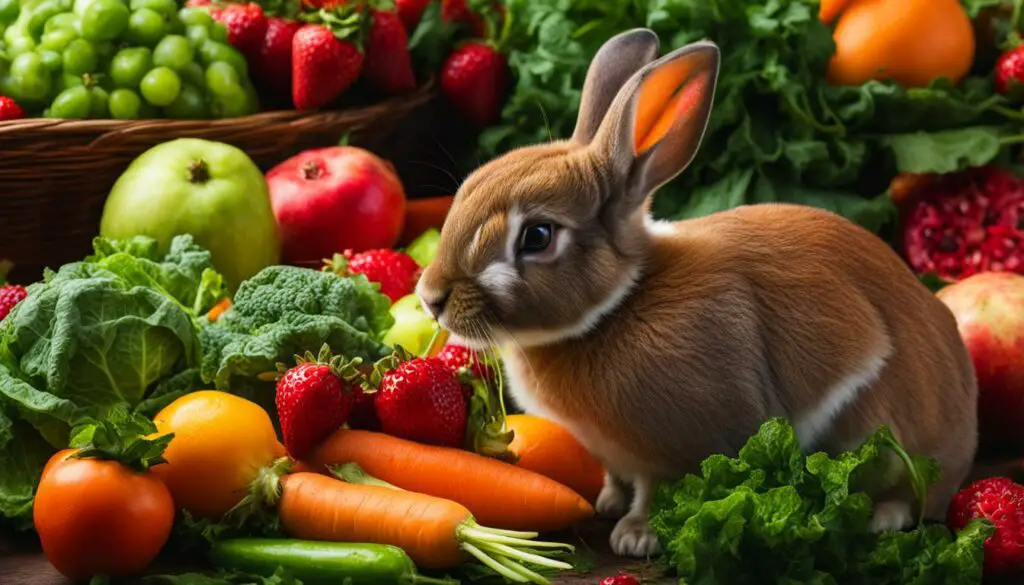
| Potential Health Benefits of Pomegranate for Rabbits |
|---|
| Packed with antioxidants to protect against free radicals |
| Possible immune-boosting properties |
| Potential anti-cancer properties |
Remember, each rabbit is unique, and their preferences may vary. Some rabbits may enjoy pomegranate, while others may not show much interest. It’s always advisable to offer a small piece of pomegranate first and observe your rabbit’s response before incorporating it into their regular diet.
Overall, pomegranate can be a healthy addition to a rabbit’s diet when fed in moderation. Its potential health benefits and delightful taste make it worth considering as an occasional treat for your furry friend.
Risks of Feeding Too Much Pomegranate to Rabbits
While pomegranate can be a healthy addition to a rabbit’s diet, it is important to exercise caution and avoid overfeeding. The high sugar content in pomegranate can lead to weight gain and other health issues if consumed excessively by rabbits. It is crucial to provide pomegranate to rabbits in moderation and monitor their overall health and well-being.
Additionally, consuming excessive pomegranate juice can cause diarrhea in rabbits. This can lead to dehydration and discomfort for your furry friend. It is important to offer pomegranate fruit pieces, without the seeds, as a treat and not as a main part of their diet. Remember to always provide your rabbit with plenty of clean water to stay hydrated.
Observing your rabbit’s reaction to pomegranate is also key. Keep an eye out for any adverse effects such as digestive discomfort, changes in appetite, or allergic reactions. If you notice any negative symptoms, it is advisable to consult with a veterinarian for guidance and support.
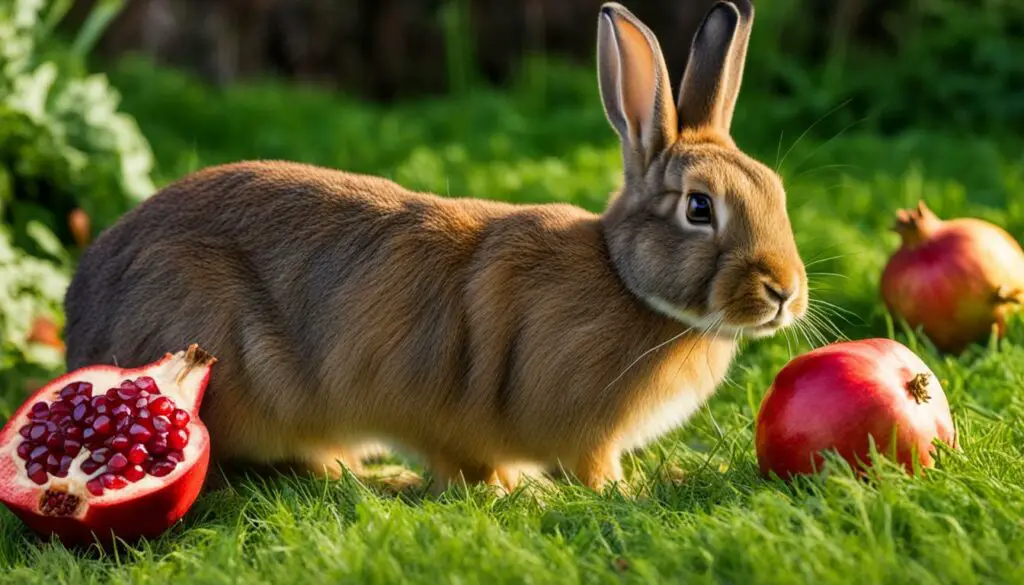
Table: Pomegranate Moderation Guidelines for Rabbits
| Weight of Rabbit | Recommended Pomegranate Amount |
|---|---|
| 1-2 pounds | 1 teaspoon |
| 2-4 pounds | 2 teaspoons |
| 4-6 pounds | 1 tablespoon |
| 6-8 pounds | 1.5 tablespoons |
| 8+ pounds | 2 tablespoons |
Feeding pomegranate to rabbits in moderation is essential for their overall well-being. By following the recommended amounts based on the weight of your rabbit, you can minimize the risks associated with excessive pomegranate consumption. Remember to always prioritize your rabbit’s health and consult with a veterinarian for personalized advice on their diet.
If your rabbit does not enjoy pomegranate or exhibits any adverse effects, there are plenty of other healthy fruits and vegetables you can offer as alternatives. It’s important to provide a balanced and varied diet to ensure your rabbit receives the necessary nutrients for optimal health.
Taste Preferences of Rabbits and Pomegranate
Rabbits, like humans, can have individual taste preferences when it comes to food. While some rabbits may nibble on pomegranate out of curiosity, others may not show any interest in it at all. It’s important to understand that not all rabbits will enjoy the taste of pomegranate, as their taste buds vary from one rabbit to another.
When introducing pomegranate to your rabbit’s diet, it’s recommended to offer a small piece and observe their response. If your rabbit shows interest and enjoys the taste, you can continue to include pomegranate as a healthy treat. However, if your rabbit does not seem to like it, there’s no need to force them to eat it. There are plenty of other rabbit-friendly fruits and vegetables available that can provide similar nutritional benefits.
Listed below are some alternative fruits that rabbits generally enjoy:
- Apples
- Bananas
- Strawberries
Remember to introduce these fruits gradually and in moderation to ensure they are well-tolerated by your rabbit’s digestive system. It’s always important to offer a balanced and varied diet to meet your rabbit’s nutritional needs.
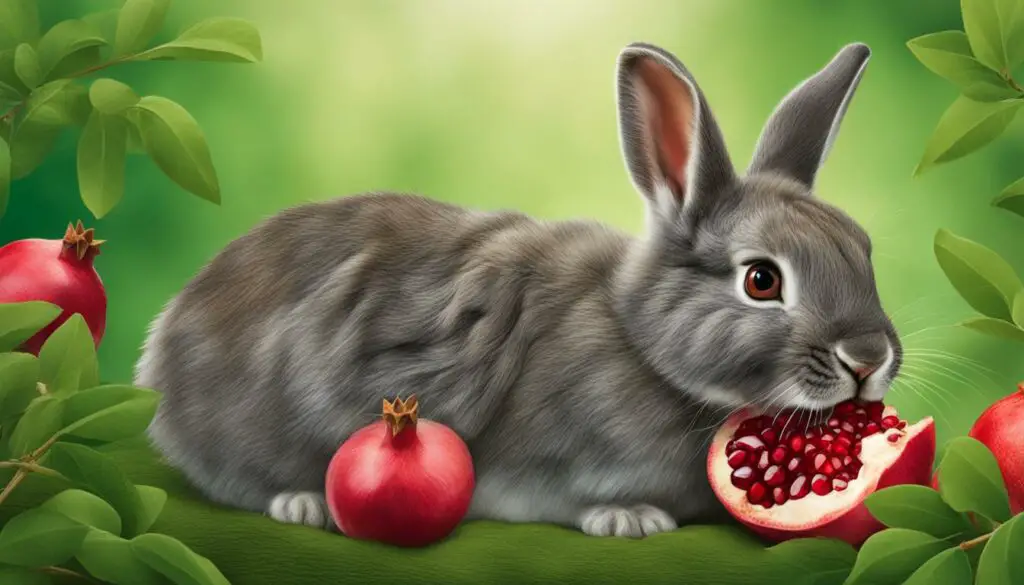
Table: Comparison of Rabbit-Friendly Fruits
| Fruit | Nutritional Benefits | Recommended Serving |
|---|---|---|
| Apples | Good source of vitamins A and C, fiber | 1-2 slices per day |
| Bananas | High in potassium and vitamin B6 | 1-2 small slices per day |
| Strawberries | Rich in vitamin C and antioxidants | 1-2 strawberries per day |
These fruits, along with other rabbit-friendly options, can provide a tasty and healthy addition to your rabbit’s diet. Remember to consult with a veterinarian for specific dietary recommendations based on your rabbit’s age, weight, and overall health.
Alternatives to Pomegranate in a Rabbit’s Diet
While pomegranate can be a healthy addition to a rabbit’s diet, it may not be enjoyed by all rabbits. If your furry friend does not take a liking to pomegranate, there are plenty of other rabbit-friendly fruits and vegetables you can offer instead. These alternatives provide a well-rounded nutritional profile and can be a delicious treat for your bunny.
Fruits:
- Apples: Rich in fiber and vitamins, apples make a great snack for rabbits. Be sure to remove the seeds and core before offering them to your bunny.
- Bananas: High in potassium and easily digestible, bananas can be a favorite among rabbits. Feed them in small pieces to prevent overconsumption.
- Strawberries: These sweet berries are packed with antioxidants and are a great source of vitamin C. Serve them fresh and in moderation.
Vegetables:
- Carrots: Crunchy and high in beta-carotene, carrots are a staple in a rabbit’s diet. They provide essential nutrients and promote dental health.
- Celery: Low in calories and high in hydration, celery can be a refreshing snack for rabbits. Offer it in small pieces to prevent choking.
- Spinach: A leafy green that is rich in iron and vitamins, spinach can be a nutritious addition to your rabbit’s diet. Feed it in moderation due to its high oxalate content.
It’s important to remember that each rabbit is unique, and their taste preferences may vary. Offer a variety of fruits and vegetables to find out what your bunny enjoys. Additionally, always introduce new foods slowly and in moderation to observe any adverse reactions. A balanced and varied diet is essential for the overall health and well-being of your furry companion.
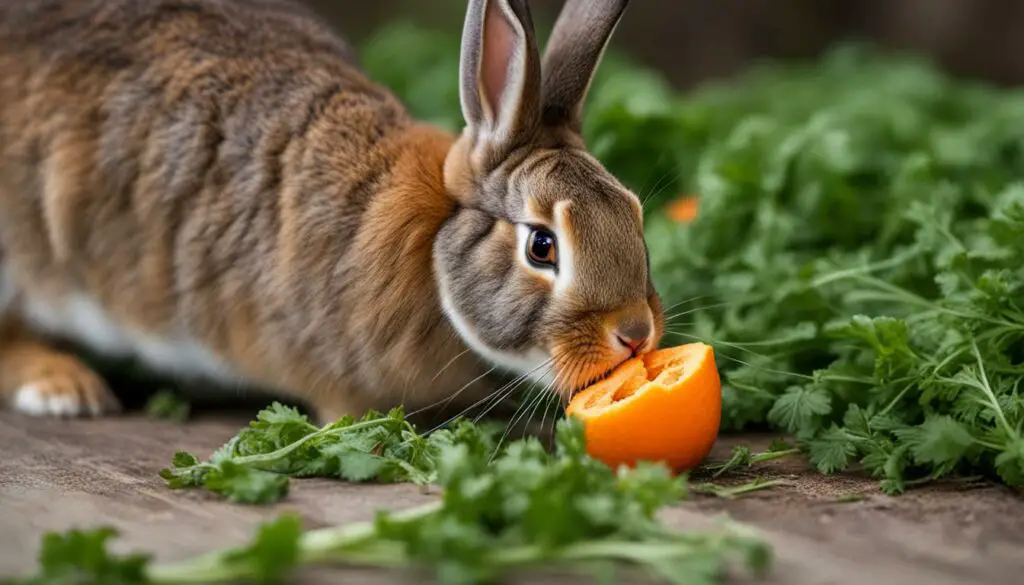
Table: Nutritional Comparison of Pomegranate and Rabbit-Friendly Alternatives
| Food | Vitamin C (mg per 100g) | Vitamin K (mcg per 100g) | Fiber (g per 100g) | Sugar (g per 100g) |
|---|---|---|---|---|
| Pomegranate | 10.2 | 16.4 | 4 | 9 |
| Apple | 0.5 | 2.2 | 2.4 | 10.3 |
| Banana | 8.7 | 0.5 | 2.6 | 17.2 |
| Strawberry | 58.8 | 2.2 | 2.0 | 4.9 |
| Carrot | 0.6 | 13.2 | 2.8 | 4.7 |
| Celery | 3.1 | 29.3 | 1.6 | 1.3 |
| Spinach | 28 | 483 | 2.2 | 0.4 |
Preparing Pomegranate for Rabbits
When it comes to feeding pomegranate to rabbits, proper preparation is essential. Start by removing the seeds and offering only the fleshy part of the fruit to your furry friend. This is important as the seeds can pose a choking hazard. Cut the fruit into small, easily manageable pieces to ensure your rabbit can consume it safely. To make it even easier for your rabbit to eat, you can mash or puree the seeds, creating a texture that is more palatable for them.
It is crucial to remove the peel before serving pomegranate to your rabbit. The peel is tough and can be difficult for rabbits to chew and digest. By providing your rabbit with only the flesh of the pomegranate, you are reducing the risk of any digestive issues or discomfort.
As with any food, it is important to ensure your rabbit has access to clean water for hydration. This will help prevent any potential blockages or dehydration that can occur when introducing new foods into their diet. By following these simple preparation steps, you can safely incorporate pomegranate into your rabbit’s diet and provide them with a tasty and nutritious treat.
“Proper preparation is key when introducing pomegranate into your rabbit’s diet.”
| Benefits of Preparing Pomegranate for Rabbits |
|---|
| 1. Removes choking hazards |
| 2. Makes it easier for rabbits to consume |
| 3. Reduces the risk of digestive issues |
| 4. Provides a safe and nutritious treat |

Summary
When preparing pomegranate for rabbits, it is important to remove the seeds and offer only the fleshy part of the fruit. Cutting the fruit into small pieces and mashing or pureeing the seeds can make it easier for rabbits to consume. Removing the peel reduces the risk of digestive issues. Providing clean water for hydration is essential. By following these preparation steps, you can safely incorporate pomegranate into your rabbit’s diet and provide them with a tasty and nutritious treat.
Pomegranate and Bunny Digestion
Rabbits have a unique digestive system that requires a careful balance of nutrients. While pomegranate can be a healthy addition to their diet, it’s important to understand how it affects their digestion. Excessive consumption of pomegranate can lead to digestive issues in rabbits, including vomiting, diarrhea, and abdominal pain.
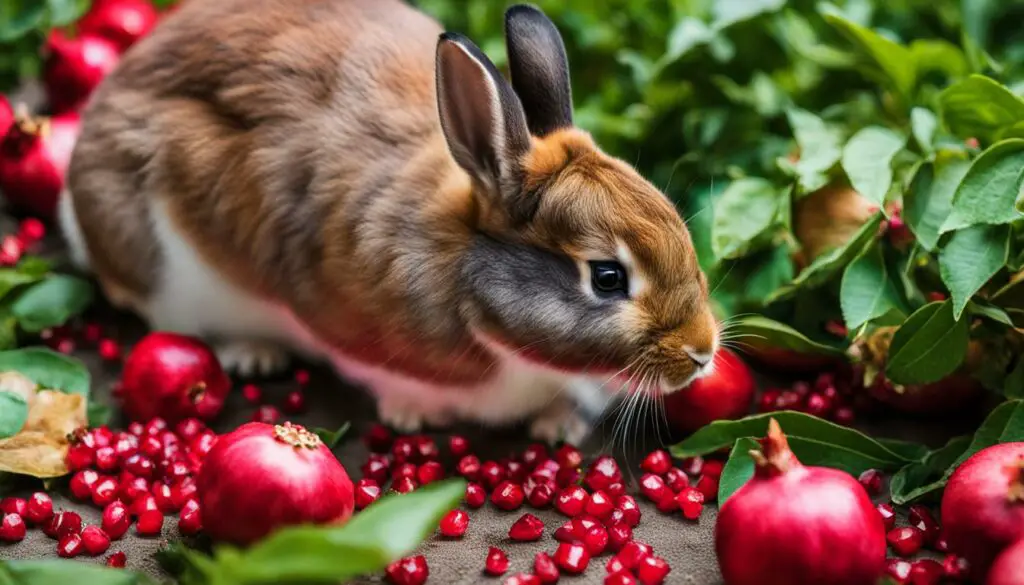
Pomegranate contains a high amount of fiber, which is beneficial for rabbits and helps to regulate their digestion. However, the fruit also has a high sugar content, which can be problematic if consumed in excess. Rabbits have a sensitive digestive system and are prone to digestive upset when their diet is imbalanced or contains too much sugar.
It’s essential to monitor your rabbit’s digestion when incorporating pomegranate into their diet. Start by offering small amounts and observe how they react. If your rabbit shows signs of digestive discomfort, such as soft stools or bloating, you may need to reduce or eliminate pomegranate from their diet. Consult with a veterinarian if you have any concerns about your rabbit’s digestive health.
Summary:
| Pros | Cons |
|---|---|
|
|
Moderation and Safety Guidelines for Feeding Pomegranate to Rabbits
When it comes to feeding pomegranate to rabbits, it is important to prioritize moderation and safety. While pomegranate can offer nutritional benefits, it should be given in small amounts due to its high sugar content. Feeding too much pomegranate to rabbits can lead to weight gain and other health issues. It is always best to start with a small amount and gradually increase if your rabbit tolerates it well.
To ensure the safety of feeding pomegranate to your rabbit, monitor their reaction to the fruit. Observe for any signs of digestive issues such as diarrhea or abdominal pain. If any adverse reactions occur, it is important to consult with a veterinarian for guidance. They can provide specific dietary recommendations based on your rabbit’s individual needs and health condition.
Additionally, it is crucial to offer a balanced diet for rabbits. Pomegranate should not exceed 10% of their overall diet to prevent digestive issues. Along with pomegranate, rabbits should be provided with a variety of other rabbit-friendly fruits and vegetables. This ensures that they receive a wide range of nutrients and flavors to support their health and well-being.
| Rabbit Diet Guidelines | Safe Fruits for Rabbits |
|---|---|
| – Feed pomegranate in moderation | – Apples |
| – Start with small amounts and monitor rabbit’s reaction | – Bananas |
| – Consult with a veterinarian if needed | – Strawberries |
| – Offer a balanced diet with various fruits and vegetables | – Blueberries |
By following moderation and safety guidelines, you can incorporate pomegranate into your rabbit’s diet in a healthy way. Remember to always prioritize your rabbit’s health and well-being when introducing new foods. With proper care and attention, you can provide your furry friend with a nutritious and enjoyable diet.
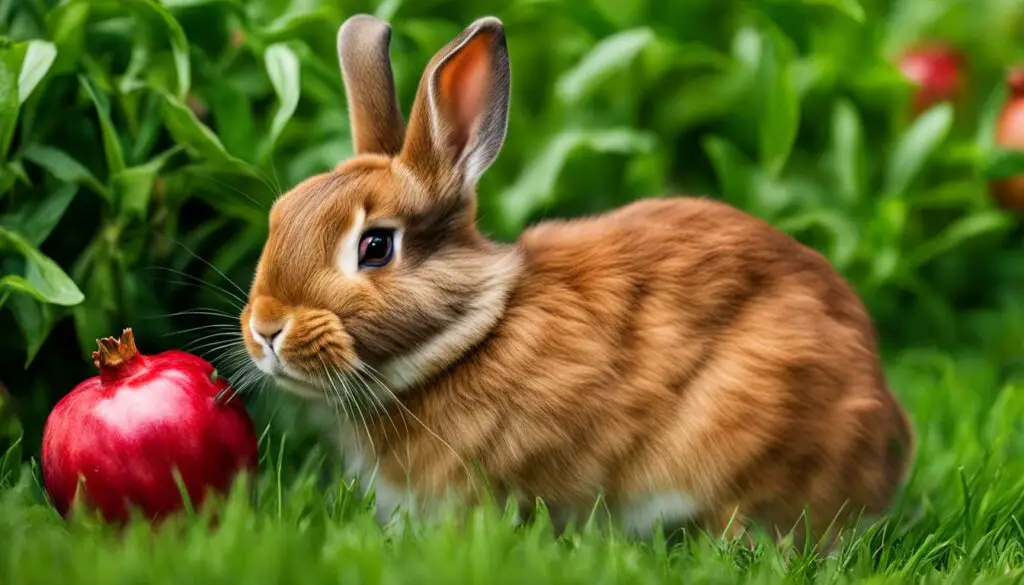
Rabbit-Friendly Fruits and Foods to Avoid
When it comes to feeding rabbits, it’s important to know which fruits and vegetables are safe for them and which can be harmful to their health. While there are many rabbit-friendly fruits that can be enjoyed in moderation, there are also some foods that should be avoided entirely. Here’s a breakdown of rabbit-friendly fruits and foods to steer clear of:
Rabbit-Friendly Fruits
Rabbits can enjoy a variety of fruits as part of a balanced diet. Some rabbit-friendly fruits include:
- Apples: Remove the seeds and core before giving them to your rabbit.
- Bananas: A small slice of banana can be a tasty treat for your furry friend.
- Strawberries: These sweet berries are packed with antioxidants and make a great occasional treat.
- Blueberries: Rich in vitamins and minerals, blueberries can be given to rabbits in small portions.
Remember to introduce new fruits slowly and in small amounts to ensure that your rabbit tolerates them well. It’s also important to wash all fruits thoroughly to remove any pesticides or chemicals before offering them to your rabbit.
Foods to Avoid
While rabbits can enjoy a variety of fruits and vegetables, there are some foods that can be harmful to their health. Here are a few foods to avoid feeding your rabbit:
- Chocolate: Chocolate contains a substance called theobromine that can be toxic to rabbits.
- Caffeine: Similar to chocolate, caffeine should be kept away from rabbits as it can be harmful to their nervous system.
- Onions and Garlic: These foods can cause digestive issues and potentially damage a rabbit’s red blood cells.
- Rhubarb: Rhubarb leaves are toxic to rabbits and should never be given to them.
It’s important to note that this is not an exhaustive list, and there may be other fruits and foods that are not suitable for rabbits. When in doubt, it’s always best to consult with a veterinarian or do thorough research before introducing new foods into your rabbit’s diet.
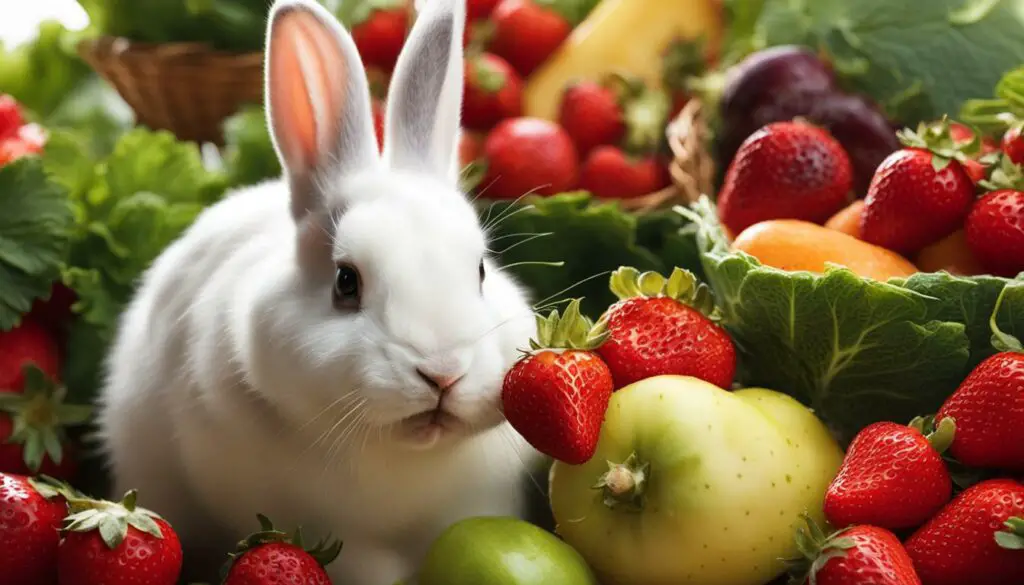
Exploring a Bunny’s Diet: Can Bunnies Eat Pomegranate?
When it comes to a bunny’s diet, there are often debates about what foods are safe to include. One such food is pomegranate. Some people believe that bunnies can eat pomegranate, while others think it should be avoided due to it not being a part of their natural diet. In this section, we will delve into the topic of whether or not bunnies can eat pomegranate and discuss its potential benefits and risks.
Pomegranate can offer several nutritional benefits to rabbits. It is a good source of vitamins C and K, as well as fiber. These nutrients can support a bunny’s immune system, promote healthy skin and fur, aid in digestion, and protect against free radicals. However, due to its high sugar content, it is important to feed pomegranate to rabbits in moderation to avoid weight gain and other health problems.
When feeding pomegranate to rabbits, it is crucial to do so safely. Start by cutting the fruit into small pieces and removing the seeds, as they can be a choking hazard. Feed the fruit pieces to your bunny as a treat, and make sure to offer it in moderation. Providing plenty of clean water for hydration is also essential. Additionally, observe your rabbit’s reaction to pomegranate and monitor for any adverse effects.
| Pomegranate Feeding Guidelines for Rabbits | |
|---|---|
| Offer no more than 1-2 tablespoons of pomegranate per 4-5 pounds of body weight. | |
| Start with a smaller amount and gradually increase if your bunny tolerates it well. | |
| Pomegranate should not exceed 10% of your rabbit’s diet to prevent digestive issues. |
Pomegranate can be a healthy addition to a bunny’s diet if fed in moderation. Its nutritional benefits, coupled with proper preparation and safe feeding guidelines, can contribute to your rabbit’s overall well-being. However, it is always recommended to consult with a veterinarian for specific dietary recommendations tailored to your bunny’s individual needs.
Author Bio
Hi there! I’m Yogesh Raval, a pet rabbit expert and blogger with a passion for farming and agriculture. I specialize in providing valuable information on pomegranate farming and the health benefits it offers. On my website, you’ll find insights into the nutritional value of pomegranates and how they can help prevent and manage various health conditions.
As a rabbit enthusiast, I understand the importance of a well-balanced diet for our furry friends. That’s why I aim to provide rabbit owners with the knowledge they need to make informed decisions about their pets‘ diet and overall well-being.
If you’re wondering about the ins and outs of a bunny’s diet, including whether they can eat pomegranate, you’ve come to the right place. I’ll guide you through the potential benefits and risks of incorporating pomegranate into your rabbit’s diet, along with tips on how to safely feed it to them.
Stay tuned for more informative articles on rabbit nutrition and other exciting topics related to our adorable furry companions. Together, let’s ensure our pet rabbits lead happy and healthy lives!
FAQ
Can rabbits eat pomegranate?
Yes, rabbits can eat pomegranate. However, it should be given in moderation, as its high sugar content can lead to weight gain and other health problems.
What nutritional benefits does pomegranate provide for rabbits?
Pomegranate is a good source of vitamins C and K, as well as fiber. It can support a rabbit’s immune system, promote healthy skin and fur, aid in digestion, and protect against free radicals.
How should I safely feed pomegranate to my rabbit?
Cut the fruit into small pieces and remove the seeds, as they can be a choking hazard. Offer the fruit pieces as a treat and provide clean water for hydration.
How much pomegranate should I give to my rabbit?
Offer no more than 1-2 tablespoons of pomegranate per 4-5 pounds of body weight. Start with a smaller amount and gradually increase if your rabbit tolerates it well.
What are the potential health benefits of pomegranate for rabbits?
Pomegranate is rich in antioxidants, which can help protect a rabbit’s body against free radicals. It may also boost the immune system and have potential anti-cancer properties.
What are the risks of feeding too much pomegranate to rabbits?
Excessive consumption of pomegranate can lead to weight gain and other health issues in rabbits. Too much pomegranate juice can also cause diarrhea.
Do all rabbits enjoy the taste of pomegranate?
Rabbits have different taste preferences, so some may enjoy pomegranate while others may not show interest. It is recommended to offer a small piece to see if your rabbit likes it.
What are some alternatives to pomegranate in a rabbit’s diet?
Apples, bananas, strawberries, carrots, celery, and spinach are some healthy alternatives to pomegranate that rabbits can enjoy.
How should I prepare pomegranate for my rabbit?
Remove the seeds and give only the fleshy part of the fruit. The seeds should be small enough to prevent choking hazards. You can also mash or puree the seeds to make it easier for your rabbit to consume.
Can pomegranate cause digestive issues in rabbits?
While pomegranate is generally safe for rabbits, excessive consumption can cause digestive issues such as vomiting, diarrhea, and abdominal pain. Monitor your rabbit’s digestion and adjust their diet if needed.
How should I safely feed pomegranate to my rabbit?
Feed pomegranate to rabbits in moderation, starting with small amounts and gradually increasing if well-tolerated. Monitor for any adverse reactions and consult with a veterinarian if needed.
Are there any other fruits and vegetables that can be harmful to rabbits?
Yes, fruits like apricots, peaches, and plums can be toxic to rabbits due to cyanide in their seeds. Onions, garlic, parsnips, and certain other vegetables should also be avoided as they can cause digestive issues or contain poisonous substances for rabbits.

